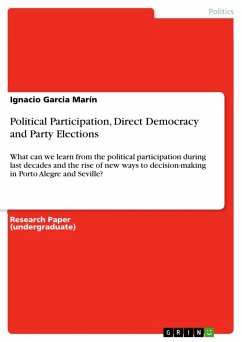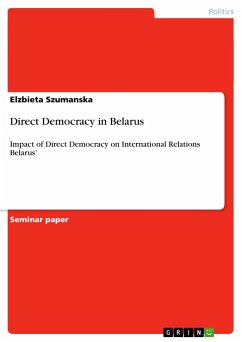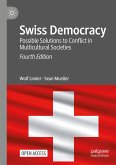Research Paper (undergraduate) from the year 2011 in the subject Politics - Region: Middle and South America, grade: 1,7, Humboldt-University of Berlin, course: 2010-2011, language: English, abstract: In this paper I am going to describe the fall of conventional political participation withinwestern European countries. Later on I am going to defend some possible ways to fix it andfinally, I will expose my proposal: promotion of direct democracy through the ParticipatoryBudgeting. With the cases of Porto Alegre and Seville, -with different situations andchallenges- the values of transparency, participation, deliberation and responsivenessbecome especially protagonist. Politicians often think that people do not have any interest forthe political arena. In fact, rarely they make decisions to try to attract citizens to institutions.Like the current Prime Minister of the United Kingdom, David Cameron, they blame externalfactors to explain why citizenship refuses in part their representatives 1. The separationbetween citizen's demands and politician's rules could be a possible answer to the tragic riotsduring last weeks in England. Similarly, the reason for the Spanish Revolution that "pushed"during May and June millions of citizens of varied social groups into the streets is not only thetremendous unemployment rate. We cannot understand any social behavior if we exclude thepolitical variable. Both David Cameron as Zapatero have decided strong economic cuts -hard to understand for citizens - while the voice of millions of Europeans against thesedecisions were expressed roundly. The sensation of politicians deaf respect citizens and theincreasing idea that they do not solve anything is frequent.At the same time, social movements, demonstrations and claims thrive, creating ademocracy with varied and multiple channels where ideas are expressed. Citizens areinterested in politics, but the current representative system is marked by slowness and rigidityof the new times. Literature shows us how voter turnout and affiliations to political parties dropdramatically until today, with alarming rates of disaffection, skepticism and distrust to politicalinstitutions. People do not find solutions and support from parties, and the divorce is a fact.However, our societies are mature and prepared for more protagonism in decision-making.We should decide more times than once every four years. We want and we need. We have towalk to a new model of democracy. Then, how are the principal Participatory Budgeting'sexperiences? What can we learn from them?








